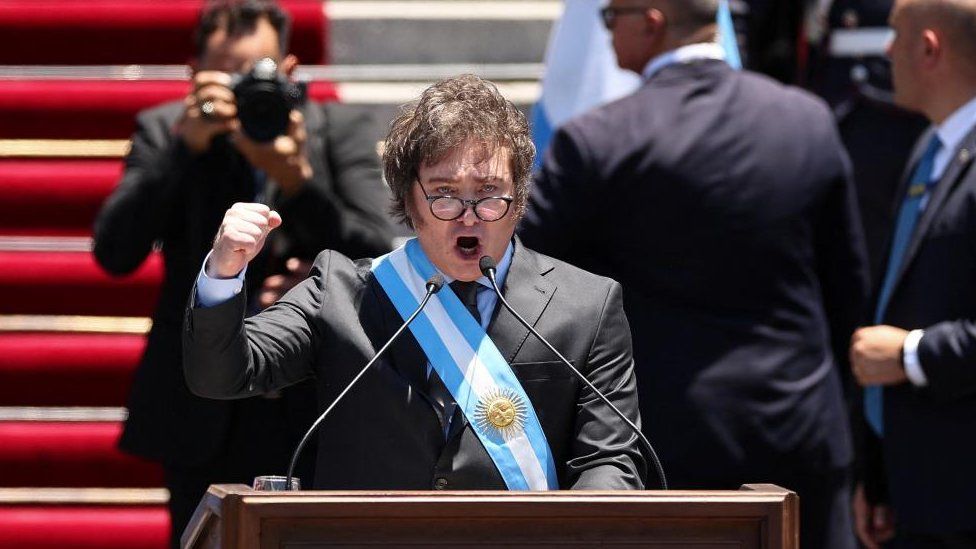
By Sean Seddon in London & Katy Watson in São Paulo
BBC News
Argentina’s new far-right president has vowed to deliver economic “shock treatment” in his first speech after formally taking office.
Javier Milei warned Argentines “there is no money” and recommitted to a programme of harsh austerity measures.
The populist outsider won a surprise election victory in November with radical pledges to overhaul the South American nation’s ailing economy.
Mr Milei’s inauguration was held in Buenos Aires on Sunday.
In a day of pomp and ceremony, the 53-year-old capped his extraordinary rise to power with a speech which left Argentines in no doubt he intends to embark on an economic path unlike any previous president.
He said he would undo “decades of decadence” with deep spending cuts, designed to slash huge public debts and drive down inflation, which is now higher than 140%.
“The bottom line is that there is no alternative to austerity and there is no alternative to shock treatment,” Mr Milei said.
“We know that in the short term the situation will worsen. But then we will see the fruits of our efforts.”
Mr Milei waved to supporters during a procession to the presidential palace alongside his sister Karina, the confidant who is expected to play an influential role behind the scenes in his new administration.
He addressed the crowd and chanted campaign slogans from the balcony, and was presented with the blue and white presidential sash and baton – which he had personalised with engravings of his five dogs.
Mr Milei has risen rapidly from relative obscurity to Argentina’s highest office on a right-wing platform which includes restricting abortion rights, liberalising gun laws and climate change denial.
He was frequently pictured wielding a chainsaw on the campaign trail, and his unflinching statements have been likened to former US President Donald Trump and former Brazilian President Jair Bolsonaro.
During the campaign he said he would replace Argentina’s currency with the dollar and abolish the country’s central bank, along with a host of government departments.
But while the presidency comes with sweeping powers, Mr Milei will face political limitations as he attempts to fix a set of daunting problems.
The peso – Argentina’s embattled currency – is in long-term freefall, poverty levels have soared to 40% and, according to IMF data, the economy is in a deep recession.
There is little doubt that Mr Milei has inherited an economy in crisis. What is not clear is whether he will continue along the path of radical solutions he proposed during his campaign or whether he will moderate his promises so as not to rock the boat.
The new president will likely face opposition in Argentina’s Congress, where the coalition of small right-wing and libertarian parties he leads has only minority representation.
Image source, Reuters
Mr Milei was seen embracing Ukrainian President Volodymyr Zelensky at the inauguration
Some observers have noted a more moderate tone since his victory was confirmed. However, hours into the job, the new president signalled he intends to govern as he campaigned by signing a decree to reduce the number of departments from 18 to nine, making good on a key pledge.
Among the guests at the swearing-in ceremony was Ukrainian President Volodymyr Zelensky, who has met several Latin American leaders as he seeks to shore up global support for his country’s war effort.
The pair were pictured embracing and Mr Zelensky later told reporters they had discussed ways Argentina could support Ukraine.
Hungary’s President Viktor Orban – who Mr Milei has been likened to ideologically – was also in attendance.
With the pomp and ceremony of the inauguration over, Argentines will now focus on how their new president approaches the job in practice.
And while Mr Milei was buoyed by the frustration of voters with previous administrations, he will now have to deliver to avoid disappointing those who backed him. His honeymoon period will likely be short.

